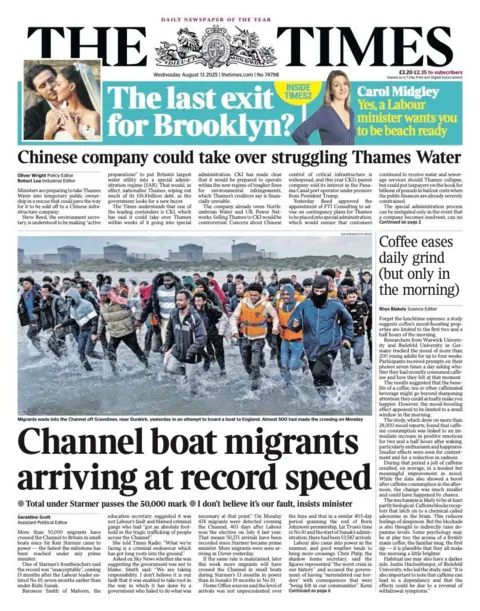In recent reports, significant headlines from various British newspapers have highlighted the surge of migrants arriving in the UK through the English Channel. The leading article from the Times claims that over 50,000 migrants have arrived, marking a record-high influx recorded under the leadership of Sir Keir Starmer. This milestone, according to the publication, is unprecedented, denoting the fastest rate ever under any prime minister’s tenure. The period in question underscores the urgent need for effective immigration policies amid growing public concern regarding border control and the challenges presented by this crisis.
The coverage of the migrant situation reflects a broader narrative within UK media about the pressing need to address various issues facing the country. The Guardian, another prominent newspaper, reported that the Treasury is considering increasing inheritance tax as part of an initiative to bridge a substantial financial gap projected to be £40 billion. With revenues from taxes on estates rapidly climbing—doubling over the last decade—the government is under pressure to recalibrate fiscal policies that could stabilize the national economy while ensuring fairness in wealth distribution.
The conversation surrounding inheritance tax is not without contention. The Telegraph emphasizes this reevaluation by stating that families may soon face a “fresh inheritance tax grab.” This assertion is coupled with the alarming mention of a significant increase in the amount of money collected through such taxes, spotlighting the growing fiscal responsibility placed on families amid economic uncertainty. As we dissect these views, it becomes apparent that the dialogue encompasses not only fiscal obligations but also societal responsibilities toward migrants seeking refuge.
Visual reports alongside these articles dramatize the turmoil surrounding these issues. Images depicting migrants boarding small boats off the coast of Gravelines, France, are juxtaposed with narratives of families bracing for potential financial burdens from rising taxes. Furthermore, various tabloids such as the Mail have captured stark sentiments by highlighting the comments from Baroness Smith of Malvern, who attributed the current circumstances affecting migration to the policies of previous governments.
The migratory phenomenon and the public reaction to it also interweave with deeper societal concerns, as illustrated by the Financial Times. The increasing pressure on local councils to accommodate these migrants intersects with the stark reality of homelessness and the critical shortage of available social housing in the UK. The urgency of addressing these challenges is exacerbated by a new arms manufacturing push due to ongoing geopolitical tensions, further complicating the national discourse regarding resource allocation.
As the discourse surrounding taxes on inheritance morphs into discussions on national responsibility toward migrants, the Daily Express has drawn attention to the staggering statistic of eight million people currently relying on universal credit in the UK—many of whom are not required to seek work, according to a report. The ramifications of such welfare scenarios present vexing questions about sustainability and the future of social programs designed for support versus those merely aiding in survivability.
Additional headlines reflecting on domestic safety, health regulations, and other societal issues pointedly highlight the interconnectedness of these themes. The mail’s headline is particularly provocative, saying, “It’s not our fault!”, as it addresses the political blame game regarding the crisis in governance affecting refugee flows. Similarly, the Metro’s attention has been drawn to crime, with stories about a bungling hitwoman captured in the UK legal system, further showcasing the disarray, alongside the critical shortcomings in addressing social concerns effectively.
In summary, the current media landscape in the UK illustrates a critical intersection of migration, taxation, and social welfare. These themes, as presented by various outlets, underscore a nation grappling with the implications of its policies while trying to manage the challenge of an unprecedented migratory crisis balancing the complexities of national needs and ethical responsibilities. The discussions initiated by these news stories reflect the evolving narrative of societal responsibility, governance, and the quest for a stable future, as citizens navigate these turbulent waters of change.











